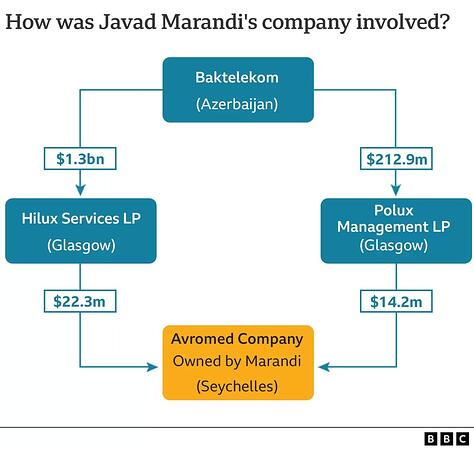A top businessman whose foreign companies were part of a global money laundering investigation is a major donor to the Conservative Party. Javad Marandi, who has an OBE for business and philanthropy, can be named after losing a 19-month legal battle with the BBC to remain anonymous. Mr Marandi strongly denies wrongdoing and isn’t subject to criminal sanction.
The judgement against him is a milestone for freedom of the press amid growing privacy laws in the courts. A National Crime Agency (NCA) investigation found some of Mr Marandi’s overseas interests had played a key role in an elaborate money-laundering scheme involving one of Azerbaijan’s richest oligarchs.
In January 2022, a judge ruled the NCA could seize £5.6m [$7m] from the London-based family of Javanshir Feyziyev, a member of Azerbaijan’s parliament. Their British bank accounts received cash that had been removed from Azerbaijan in what the judge said had been “a significant money-laundering scheme”. The family have denied that allegation - and at the outset of the hearing, in October 2021, Mr Marandi was granted anonymity in court.
Now, High Court judges have ruled that Mr Marandi can be identified because he had been a “person of importance” in the NCA’s case. Mr Marandi, 55, was born in Iran and grew up in London, where he still lives.
His ties to the Conservative Party emerged through reports of his generous donations. Between 2014 and 2020, he gave £756,300, according to Electoral Commission records. In February 2022, the Sunday Times reported he was a member of a group of major donors who had access to senior party members, including to then prime minister, Boris Johnson.
Mr Marandi was described in court as a “highly successful international businessman” with a broad portfolio of business interests in the UK and abroad. He owns the iconic design brand, The Conran Shop, a stake in Anya Hindmarch Ltd, the luxury handbag firm, and an exclusive private members’ club and hotel in Oxfordshire. Along with his wife, he heads the Marandi Foundation, which funds the Prince and Princess of Wales’s charity. None of Mr Marandi’s UK businesses or these organisations form any part of the NCA’s investigation, which looked at earlier events.
After the court ruled the NCA could seize millions from the Feyziyev family’s British bank accounts, the BBC and London Evening Standard argued it was in the public interest to disclose that some of Mr Marandi’s overseas interests had been part of the case.
Judge Zani ruled, in May 2022, that Mr Marandi - who was referred to as MNL - could be named under principles of open justice, saying he had been a “person of importance to the main proceedings”. That ruling triggered more than a year of further challenges by Mr Marandi.
Last month, two of the country’s most experienced judges ruled the media could name Mr Marandi. They concluded that open justice was a fundamental principle and that anonymity should only be allowed in exceptional circumstances. Mr Justice Mostyn said: “My only surprise is that the anonymity order was granted in the first place. For reasons of procedural unfairness as well as a distinct lack of merit, it should never have been granted.”
Duncan Hames, director of policy at the anti-corruption research group Transparency International UK, said the Conservative Party had questions to answer.
“This is a political bombshell,” he said. “We’ve learned today that someone who’s given hundreds of thousands to a British political party has, in the words of the judge, been a person of importance in proceedings before the court about a major money-laundering enterprise. That should be a concern, not just to people who are worried about where that money came from, but about what it says about how easily money can reach political parties without [them] doing proper checks on on its origins.”
The former Liberal Democrat MP added: “It’s not good enough just to check whether someone is on the electoral roll. Our political parties need to be much more careful about who they take money from.”
Dodgy dealings and dirty money are, unsurprisingly, behind Tory Party funding. Those party donors who are complicit in criminal financial dealings should, obviously, be identified - both they and the recipients, although not criminals themselves, benefit from crime and assist in its success.

